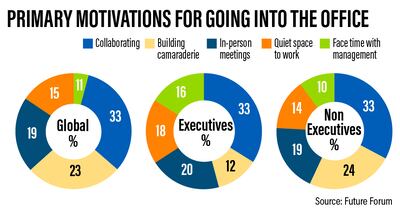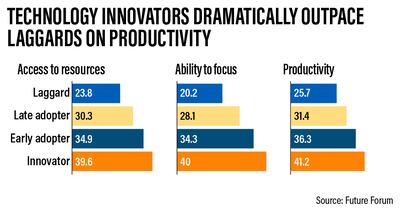Employee burnout is at a record high globally, with more workers seeking flexibility in the workplace, a new study from Future Forum has shown.
About 42 per cent of employees globally are experiencing burnout at work, an increase of 2 per cent compared with that of the previous three-month period. The figure is also an all-time high since May 2021.
Workplace flexibility, which allows productivity no matter where or when an employee performs his or her duties, plays a big factor in burnout levels.
About 53 per cent of those who are dissatisfied with their level of flexibility said they are burned out, compared with 37 per cent who are satisfied, the research group backed by Salesforce's Slack Technologies said in a report on Wednesday.
Employees who have no ability to shift their schedules are 26 per cent more likely to say they are burned out compared to those with moderate schedule flexibility, the survey said.
“Flexible workers are equally or more likely to feel connected to their immediate teams as fully in-office workers,” the report said.
“They are also more likely to feel connected to their direct manager and their company’s values compared with those who are back in the office full time.”
Burnout is a syndrome conceptualised as resulting from chronic workplace stress that has not been successfully managed, according to the World Health Organisation.
It is characterised by three “dimensions”: Feelings of energy depletion or exhaustion, increased mental distance from one’s job, feelings of negativism or cynicism related to one's job and reduced professional efficacy, the WHO said.
Burnout is also not classified as a medical condition, but rather as an occupational phenomenon, it said. However, it can be a big factor in influencing mental health.

“Addressing burnout has to be a priority: stress levels are high, risking workforce burnout. [Employees] want more help from their organisations to manage their mental health,” the Association of Chartered Certified Accountants said in a separate study this week.
Age and gender are highly correlated with the likelihood of experiencing burnout, with women and younger people significantly more likely to say they are burned out, Future Forum said.
Around 46 per cent of women say they are burned out compared to 37 per cent of men, while 48 per cent of those under age 30 believe they feel burned out against 40 per cent of those who are age 30 and above, it said.
“The younger you are, the more likely you are to say you are burned out,” Future Forum said.
Burnout also plays a major influence in worker experience and talent retention. People who say they are burned out report 1.8 times lower overall satisfaction and are 3.4 times more likely to seek a new job in the coming year, the study said.
Almost 60 per cent said they are open to looking for a new job within the next year, which is a 4 per cent rise since the summer.
Among those who say they are dissatisfied with their level of flexibility, three quarters say they intend to look for a new opportunity within the same period.
“Burnout contributes to degraded employee experience and increased attrition,” Future Forum said.
The level of investments in technology also affects employee experience. Businesses that prioritise this are seeing workers who have elevated scores in productivity and the ability to focus, as well as almost 3 times higher scores on satisfaction, Future Forum said.
“Workers who perceive their companies to be laggards — defined as organisations that generally only use technology after it becomes mainstream — are 31 per cent more likely to report feeling burned out at work than those who say the companies they work for are innovators,” it said.

Seniority, meanwhile, plays a big role. Three quarters of executives have little to no constraints on their schedule compared to 41 per cent of non-executives, the study said.
Executives are also almost three times more likely than middle managers to have zero schedule constraints, and this number grows to nearly four times when compared to individual contributors, it said.
“The data shows that schedule flexibility is still largely considered a perk or benefit of seniority, with executives significantly more likely to have access to flexible schedules than non-executives,” Future Forum said.






